| All Artists: Giacomo Meyerbeer, James Judd, Deborah Cook, Della Jones, Philharmonia Orchestra, Geoffrey Mitchell Choir, Christian du Plessis, Marilyn Hill Smith, Alexander Oliver, Roderick Earle, Ian Caley Title: Meyerbeer - Dinorah / D. Cook ∑ du Plessis ∑ A. Oliver ∑ D. Jones ∑ M. Hill Smith ∑ R. Earle ∑ I. Caley ∑ PO ∑ Judd Members Wishing: 2 Total Copies: 0 Label: Opera Rara UK Release Date: 12/4/1996 Album Type: Box set, Import Genre: Classical Style: Opera & Classical Vocal Number of Discs: 3 SwapaCD Credits: 3 UPC: 792938000527 |
Search - Giacomo Meyerbeer, James Judd, Deborah Cook :: Meyerbeer - Dinorah / D. Cook ∑ du Plessis ∑ A. Oliver ∑ D. Jones ∑ M. Hill Smith ∑ R. Earle ∑ I. Caley ∑ PO ∑ Judd
 | Giacomo Meyerbeer, James Judd, Deborah Cook Meyerbeer - Dinorah / D. Cook ∑ du Plessis ∑ A. Oliver ∑ D. Jones ∑ M. Hill Smith ∑ R. Earle ∑ I. Caley ∑ PO ∑ Judd Genre: Classical
|
Larger Image |
CD Details |
CD ReviewsMeyerbeer Rarity Torquato Tasso | 02/18/2000 (4 out of 5 stars) "Dinorah (also called Le Pardon de Ploërmel) is a quaint piece about superstitious Breton peasants, with some lovely music, especially for soprano. The opera premiered in 1859, with Marie Cabel in the title role; celebrated baritone (and acquaintance of Rossini) Jean-Baptiste Faure as Hoël, the romantic lead; and Charles-Louis Ste.-Foy as the comic tenor Corentin (like Ali in Azor et Zémire). The critic for L'Année Musicale praises all three principals, as well as the goat. (A subsequent goat was less well-behaved: it butted Dinorah into the ravine and jumped in after her.) The opera is set in Brittany; the names Hoël and Corentin are genuine Breton names, as is the place-name Ploërmel; the pardon is a religious festival. Briefly, Dinorah's house has been burned down in a storm; Hoël, in hopes of getting money to rebuild it, has gone off in search of an enchanted treasure in a ravine. The only drag is that the first person to touch the treasure will die within a year; Hoël consequently lures Corentin into joining him in searching for the treasure. Meanwhile, Dinorah wanders about mad, as a result of Hoël's desertion. In the end, Dinorah inadvertently reveals the treasure's curse to Corentin, who now refuses to go in after it, and gets Dinorah to go into the ravine instead. She does; a storm hits; Hoël, finally recognizing her, runs in after her. The good-natured Corentin, showing no resentment of Hoël's attempt to get him killed (whioch indeed is treated rather lightly in the opera), runs to the village for aid, while Hoël, stricken with remorse, begs Dinorah to revive. She does, the two have a tender reunion, and Hoël persuades Dinorah that the previous year has only been a dream. Apparently, her house has, somehow or other, been rebuilt, since Hoël points it out to her. Given that Hoël's purpose in seeking the treasure in the first place had been to rebuild her home, this is somewhat puzzling. But not too much should be made of the plot of this unassuming little piece. The characterization in largely adequate, and the music quite lovely. The only major defect is the overture, which is too long. Among the musical numbers, I single out for special praise Dinorah's two arias, her lullaby to her (imagined) goat, and her Shadow Song; Hoël's two arias, especially the Act III aria, "Ah! mon remords te venge"; and the couple's final duet.The most unique feature about Meyerbeer's music is the orchestration, which is very colorful, imitating for example the goat's bell, thunder, and frequently the singer's (especially Dinorah's) voice. There are a couple of brief interludes for the villagers, but at least there's no ballet. (Not that I have anything against ballet, just not in the middle of my opera, s'il vous plaît.) The lead singers are Deborah Cook, who sings with ethereal beauty, particularly in the goat lullaby, the Shadow Song, and when reciting the legend of the treasure's curse, as well as the final duet; baritone Christian Du Plessis, who also sings beautifully, especially in the Act III aria, when he thinks Dinorah is dead; and Alexander Oliver, who sounds fine as the comic tenor (for example, in the Act I duet with Dinorah). The conductor is James Judd, with the Philharmonia Orchestra and the Geoffrey Mitchell Chorus (London, 1979). The notes are interesting and informative, though with a few errors (saying that the goat to whom the lullaby is addressed is the real goat); the libretto is riddled with spelling errors and typos." Charming Meyerbeer Michael K. Halloran | 11/04/1999 (5 out of 5 stars) "This work, a staple of such prime donne as Adelina Patti and Amelita Galli-Curci, has all but disappeared from modern opera stages. Thankfully, the people at Opera Rara have produced this recording, so those of us who are curious may see just what the opera has to offer. While it is not a masterpiece, it is quite charming and filled with much delightful music, not the least of which is the most famous aria, the heroine's "Shadow Song." That aria is well sung by Deborah Cook, small and fleet of voice (not unlike Galli-Curci) and capping the aria with a high F. The rest of the singers are great, with Della Jones and Marilyn Hill Smith in small roles. It goes without saying that Opera Rara's packaging and presentation are first-rate. An important addition to operatic recordings."
|

 Track Listings (14) - Disc #1
Track Listings (14) - Disc #1